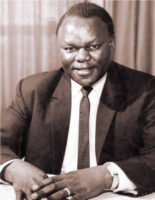
What comes to one’s mind whenever one converses with James Charles Nakhwanga Osogo is Shakespeare’s dictum in as you like it: “All the world’s a stage, And all the men and women merely players; They have their exits and their entrances; And one man in his time plays many parts…”
At his Kilimani home in Nairobi, the evidence of Osogo’s graceful aging is a doting granddaughter who won’t leave the old man alone. Clearly, the young girl will one day understand that his grandfather was a pioneering political leader, one who contributed greatly to shaping the political theatre that Kenya is.
Osogo fought many political battles and stuck out his neck sometimes in the most charged of circumstances in Kenya’s history. In 1975, for instance, following the death of Josiah Mwangi Kariuki, Osogo who was the Minister for Health, led the Government’s attempt to scuttle the Parliamentary Select Committee’s report that had implicated Police Commissioner Bernard Hinga and General Services Unit Commandant Benjamin Gethi in the murder.
The Busia South (now Bunyala) MP moved a motion urging the House to “…note and understand rather than accept the report”. This amendment motion was defeated. MPs were so incensed that they could not entertain anything that would water down the motion.
Today, Osogo explains the circumstances in which he moved the motion thus: “I had no ulterior motives. All I wanted was to save the Mwangale report. What had happened was that an initial report which I happened to have seen had many more names (of people implicated) compared with the one that Mwangale had presented in parliament. It appears that Mwangale had been forced to withdraw the first report because the names of some very senior politicians were in it but some of us had seen this very report.”
Whether it was because of his taking a pro-Government line at a time when the mood in Parliament and elsewhere was anti-Government remains a matter of conjecture. What is for sure is that in the post-JM murder period, his political stock appreciated, a major boost to his career being his elevation to the position of Deputy Leader of Government Business in the House.
Osogo was born in the little village of Bukani in Bunyala district in 1932, the second born in a family of 10. He was raised in a strict Catholic family, his father being an official of the local church. Indeed, he says that, as a child, his first desire was to join a seminary and become a priest but that this was not to be. But he ended up at St Mary’s Yala School, the famous Catholic-church sponsored institution that nurtured many a talent in Kenya’s formative years. Indeed, his school-mates included a certain Thomas Joseph Mboya.
After school, Osogo had a lingering ambition for the military, specifically the Royal Navy, but opportunities in this area were scarce and thus he took an opportunity to serve in the East African Railways – a major source of employment then. This entailed training at the East African Railways and Harbours Institute (today, the Kenya Railways Training Institute) in Nairobi.
If Osogo’s political consciousness, particularly against the colonialists, had been pricked while at Yala, joining the Railway Institute brought him face to face with the brutal face of imperialism. He would witness and participate in the riots called by such fiery trade union leaders as Markhan Singh and Kung’u Karumba.
